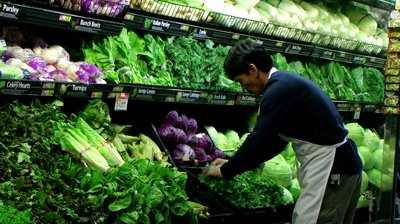13 ways students can save money on food
Saving money on food as a student.
Saving money on food can be tough for many students since it’s very challenging to eat healthy while sticking to a strict budget. Discovering ways to save money as a student can be very rewarding not only for your wallet but also your own fulfillment.
Since we spend most of our lives thinking about what our next meal should be; here are some tips on ways to save money on food as a student.
1. Learn how to cook
You don’t have to be a master chef, but learning how to cook from scratch will save you more money than you may realize, and it’s also a great life skill to obtain.
There are tons of online resources for recipes and tips (one of my favorites is AllRecipes.com).
2. Avoid restaurants
This might be a bit challenging for a student since time is priceless and restaurants are a quick & easy way to eat, but it will be worth it. It’s very easy to be tempted by the convenience of fast food, but it’s very important to remember that you are not only compromising your health by consuming fast food, but you’re also slowly eating away at your budget that could be used towards better and healthier foods from the local grocery store.
Sit down restaurants will cost you more because of the mark-up in food costs, plus, you will need to tip your server – so it’s best-set limits on eating out, such as special occasions only.
3. Move near a grocery store
This is not always easy but if possible, try to pick an area to live where there is a grocery store near your residence or along your daily route. Even if you live within walking distance of a more expensive grocery store, it will still be better for you to grocery shop there rather than running to the nearest fast-food chain for your next meal. But of course, a budget grocery store will be a bonus.
4. Eat fresh
Try shopping in the fresh produce section, rather than the frozen food section. Produce is much cheaper than prepared convenience foods and not to mention, much healthier! Yes, some products will take more effort to prepare, but there are also fruits and vegetables that are perfect for eating raw.
5. Shop clearance
Bright neon stickers are usually the markers for reduced meats, produce, bread, and many other grocery items. These products are not expired (usually) but are close to expiration. If you’re grocery shopping in the morning for a meal that night, produce that is perfectly ripe will work great for your meal.
While shopping the clearance rack, it’s important to keep a keen eye to help you avoid picking up foods that are a bit too close to expiration.
6. Shop wholesale
Consider buying more wholesale, value, and family pack products. If you’re a student living alone it can be very tricky because you might end up with way too much food, so be sure to check expiry dates and try to work out whether you can conquer a wholesale sized product in time.
If you have roommates, consider splitting a membership to Costco. This way you can split your family-sized packs with your roommates.
7. Save while shopping
An easy way to save money while grocery shopping is by learning how to shop the sales, how to price match, how to use coupons, as well as using Checkout 51 and other rewards programs.
8. Try to collect points
A simple way to get free groceries is to make sure to shop at grocery stores that let you collect points. Grocery stores that give you points such as President’s Choice Points, Sobeys Points, Air Miles, and Shoppers Optimum Points are an effortless way to gain free grocery rewards.
Try to focus on collecting points at your nearest grocery store, but also consider signing up for all of these memberships because they’re free.
9. Buy meat and produce to freeze
Full-priced meat is not always cheap, so learning how to stockpile meat and produce while it’s on sale is the perfect way to avoid paying retail prices. A chest freezer is not an appliance that most students will have, but stockpiling meat and produce can still be done in smaller portions. For example, you can buy a family pack of 4 steaks, eat one and freeze the extra 3 to eat over the next couple of weeks.
10. Remember that convenience always costs more
The more convenience that a product provides you, the more money it’s likely to cost. For example, a bag of ready-to-eat veggies will cost more than fresh veggies that you can cut, wash, and cook. This point applies to junk food and the tax that is applicable, too. Don’t forget that shopping convenience stores will also cost you more than a regular grocery store.
11. Check expiry dates
There is nothing worse than purchasing food from the grocery store that is a lot less fresh than you expected. Be sure to check the expiry date and best before dates on all of your purchases to ensure that you’re getting the most for your money.
12. Feast with roommates or friends:
Roommates are like a second family, so a fun and frugal way to plan meals is to eat together as a family. Everyone can help prepare courses as well as pitch in on paying for the ingredients. If you live alone, it’s also a terrific idea to have a potluck get-together with friends.
13. Live with your parents
When you’re sharing a house with your parents, they will not only help you save money on rent but also food. Home-cooked meals are the best kind of meals and it’s not only a great way to save money but also a quality time that can be spent with your parents.
Parents can charge rent and living fees for less than you would be able to find anywhere else. If your parents are willing to provide you with living as well as eating without charging you rent – helping with chores is a great way to show your appreciation.
Students can be incredibly creative when it comes to budgeting. What are some ways that you have managed to save money on food while living the student life?




